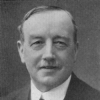Arthur Henderson

Arthur Henderson
Arthur Henderson PCwas a British iron moulder and Labour politician. He was the first Labour cabinet minister, won the Nobel Peace Prize in 1934 and, uniquely, served three separate terms as Leader of the Labour Party in three different decades. He was popular among his colleagues, who called him "Uncle Arthur" in acknowledgement of his integrity, his devotion to the cause and his imperturbability. He was a transitional figure whose policies were, at first, close to those of the Liberal...
NationalityBritish
ProfessionPolitician
Date of Birth13 September 1863
Moreover, war has become a thing potentially so terrible and destructive that it should have been the common aim of statesmen to put an end to it forever.
He would see civilization in danger of perishing under the oppression of a gigantic paradox: he would see multitudes of people starving in the midst of plenty, and nations preparing for war although pledged to peace.
In our modern world of interdependent nations, hardly any state can wage war successfully without raising loans and buying war materials of every kind in the markets of other nations.
In some states militant nationalism has gone to the lengths of dictatorship, the cult of the absolute or totalitarian state and the glorification of war.
We had four years of world war which the peoples endured only because they were told that their sufferings would free humanity forever from the scourge of war.
In almost every country there are elements of opinion which would welcome such a conclusion because they wish to return to the politics of the balance of power, unrestricted and unregulated armaments, international anarchy, and preparation for war.
It is because I believe that it is in the power of such nations to lead the world back into the paths of peace that I propose to devote myself to explaining what, in my opinion, can and should be done to banish the fear of war that hangs so heavily over the world.
The more the history of the World War and what led up to it is studied, the more clearly those tragic years become revealed as a vast collapse of civilization.
The vast upheaval of the World War set in motion forces that will either destroy civilization or raise mankind to undreamed of heights of human welfare and prosperity.
In short, it may be said that on paper the obligations to settle international disputes peacefully are now so comprehensive and far-reaching that it is almost impossible for a state to resort to war without violating one or more solemn treaty obligations.
Four years of world war, at a cost in human suffering which our minds are mercifully too limited to imagine, led to the very clear realization that international anarchy must be abandoned if civilization was to survive.
On the contrary, the characteristic element of the present situation is that economic questions have finally and irrevocably invaded the domain of public life and politics.
We cannot give up hope for the future of humanity because it is our destiny to shape that future for good or ill.
Originally the League was forbidden to touch the subject of tariffs, and there was a strong predisposition to regard banking as a mystery that must be removed entirely from the purview of governments.